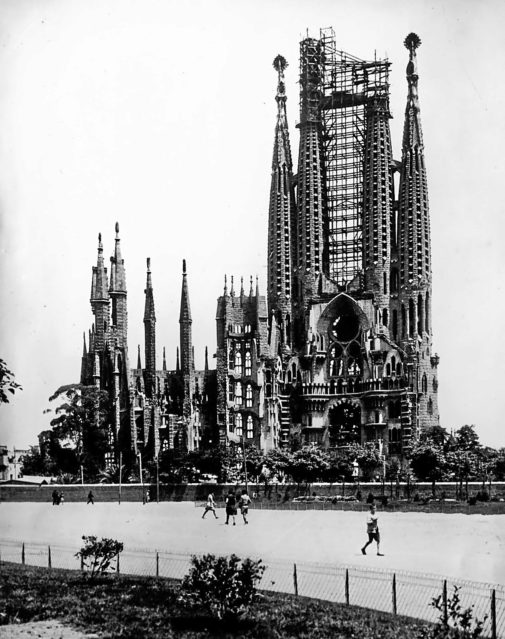There is an obvious cause and effect relationship between the surname of Xavier Güell , a famous international orchestra director who has been a writer for some years, and his obsession with Antonio Gaudí . His great-great grandfather was Eusebio Güell, the patron and protector of the architect since the 70s of the 19th century, and as he explains, the fascination for genius came to him in a direct and natural way. "Since I was a child I saw armchairs and objects in my grandfather's living room, and in my family Gaudí was a preferred subject, it provoked enormous respect," he said.
However, anyone who admires Gaudí's architectural and decorative work encounters the same obstacle that Xavier Güell encountered at any time: the facades and moldings speak eloquently - at one point in our interview he describes the terraces of La Pedrera as "an opera in stone" - but about Gaudí's life there are years of documentary emptiness and nothing is known about his thinking because he was a reserved, silent person who barely left notes -and much less work- written.
Which leads to a frustrating dead road: here is a genius whose psychology, unlike Wagner's, for example, can hardly be accessed. But that also opens a back door that can be used for the sake of imagination. And hence Güell has titled his third book Yo, Gaudí (Gutenberg Galaxy, 2019), for being a novel biography in which he decides to adopt the teacher's voice .
"When I was conducting an orchestra," he explains, "I wanted two things: to know what was in the notes, that is, to know the hidden interior of the music, and also to become the composer himself." In the same way, he has read everything possible about Gaudí -biographies, scattered documents, essays, analysis-, he has probed in the archives and in the family memory, with such an understanding of the "hidden interior" of the architect, then getting into his body to be his voice from a series of supposed letters that Gaudí would have addressed to Alfonso Trías , the son of lawyer Martín Trias, and with whom he had an affectionate relationship since Alfonso was a child. "If someone had entrusted his thoughts, it would have been him."
In this way, using long epistles -like the ones Seneca sent to Lucilio, or in the style of the Memoirs of Adriano de Marguerite Yourcenar or Oscar Wilde's De depthis, as Güell himself points out-, this projection of Gaudí He speaks and explains his life, his thoughts and mysticism, and with it he builds an unknown Gaudí in many aspects: linked to Freemasonry, cornered by many popes of the first modernism for fear of his early talent, belittled by the later avant-garde , which It begins with Picasso, for being had as a representative of the old art; "he was rejected as a carcamal, he was considered retrograde, late, conservative," says Güell. And thanks to the agile rhythm of writing and the profusion of data, the book works as a copy (and singular) biography in an arena still very depleted of information.
It is true that, like me, Gaudí starts from the technique of the novel, sometimes Güell uses imagination to complete - taking responsibility for fictions - the blind spots of the architect's biography. For example, in the first letters, (his) Gaudí recounts a visit of youth to the famous brothel of Avignon street in Barcelona . "That is not documented," admits Güell. "But we do know that in his youth he was a dandi, and at 25 he already earned more money than he had dreamed, and he gave himself to all kinds of excesses." In this way, Güell divides Gaudí's biography into two, one of youth that has nothing to do with his mystical and introspective maturity. "If we stay with the blessed Gaudí of the last years, we forget that as a young man he was a vividor, very marked by his vital impulses, in tune with his southern character."
In any case, the surviving Gaudí is the mystic who raised the first scheme of the Sagrada Familia , the visionary of La Pedrera and Casa Batlló, that of the Park Güell, and which the author places - in the company of Beethoven, Michelangelo and Verdi- among the lineage of the great geniuses who produce the best of their work in their last years, in old age, just when the talent of the majority is no longer enough. "I like to compare the last Gaudí," says Güell, "with the Wagner of Parsifal, or with the Beethoven of the last quartets, because in his last works he exceeds his own time and transcends the moment. If only we had preserved his first projects, he would be one more among the modernists, and not even the best. But in his last works he creates works for humanity. "
In short, Güell presents a Gaudí with a plan : someone endowed with the vision of absolute genius, who isolates himself from his present - "he was not deaf, like Beethoven, but as if he were; he did not attend to others" -, who He came to be considered an extravagant who would end up forgotten - "the same thing that happened with Mahler," says Güell - but who knew that this present was a necessary transit before reaching immortality. "Many of his phrases are not remembered," concludes the biographer, "but there is one that is known to have said, and it is 'my time will come'." And his time came, stopping, as you know, all the clocks.
According to the criteria of The Trust Project
Know more- culture
- Architecture
The unleashed look Alberto Campo Baeza: "How to make people see that most of the time their houses are a horror"
Architecture The works of Notre Dame resume after three weeks paralyzed and still at risk of collapse
ABELES AND CAINES The Goytisolo: an insatiable thirst for love and anger

